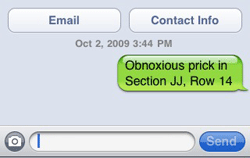The idea behind stitcher is simple. Organize your favorite podcasts and listen to them all together, in the order you want. It seemed more appealing as an iPhone app than on the desktop. (Like so many things). This is what Jeff Jarvis calls “be the platform, not the commodity.”
When our local news radio station switched from CBS to Fox, I really didn’t have a source for national news (after dropping XM some months ago). And I just never seemed to be in the car at the top of the hour.
With stitcher, I select from a variety of news (or other genres) sources and stack them in the order I want to hear them. And stitcher will email or txt me when something updates.
I can really program my own radio station now.
A feature I’d like –but didn’t find on the website– is the option of adding a local or state newscast to my line-up. You can submit a podcast and hope the stitcher folks add it but we’ll have to see how that works.
If I were programming a local station –or even a state news network– I think I would produce at least two special newscasts each day, designed just for podcasting. I’d have one online by 6 a.m. (local time) and the other by 4:30 p.m. I’d probably keep them in the 5 min or less range.
I’d do my best to get stitcher to add them to the lineup while promoting the podcast on air to the local audience.
Here’s something else I might try…
I’d create a KXYZ News Twitter page and blast out any and ever nugget of news I could find. From any news source. Local newspaper, TV station, news releases, blogs… wherever. And once an hour I’d link my tweet to a 2 min audio news summary. With a reminder that more news can be found on our website.
I think the real challenge for MSM is to stop thinking in terms of what is best for us and ask what would be interesting or useful to those formerly known as The Audience. Only then can we begin to reinvent ourselves for the future that is already here.
PS: And one more thing. If I was one of the growing number of reporters (print, radio or TV) currently out of work, I’d use some of my spare time to produce the podcast described above. You don’t need a printing press or studios or radio/TV transmitters or towers. You need a laptop and a camera and a smart phone. And some imagination. Bet you won’t be without a job for long.

